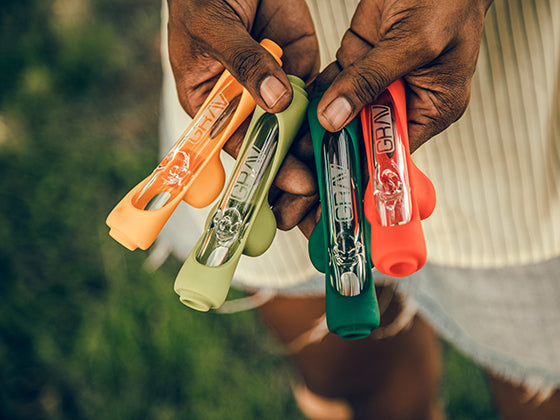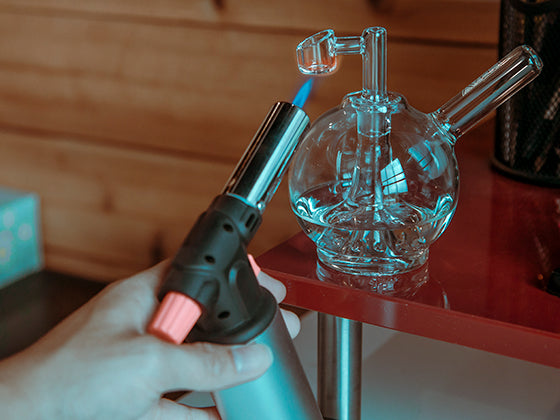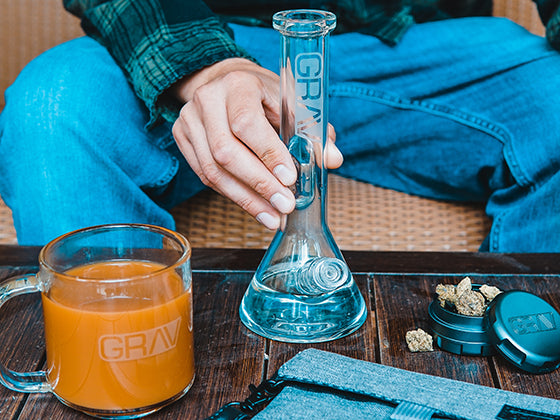written by Kate McDermott
Another year, another slew of states fighting the good fight for marijuana legalization. While 2020 may not go down in history as anyone’s best year, there may be a silver lining for residents of some states.
Cannabis initiatives are on the ballots in five states this year, although not the state in which GRAV and its employees call home. *Cries in Texan.*
Still, we’re not petty. So we’ll be rooting for the people of these lovely states on election day. There are also two very interesting measures on Oregon’s ballot this year. While they’re not cannabis-specific, they’re definitely worth watching. So look for that at the end.

Arizona — Recreational Legalization
Medical marijuana has been legal in Arizona since 2010. It was touch-and-go for a while there, since just a few months before that election, 45% of Arizonians expressed concerns about medical dispensaries opening “near other stores in their area.” But the measure passed.
The state then voted on recreational legalization in 2016, and the “nays” barely eked out a majority with 51.32% voting no.
This year, they’re trying again. Prop 207 would legalize possession and use of marijuana for anyone over the age of 21. Legalization will come with a 16% tax on sales.
It would also let those convicted of some marijuana-related crimes seek expungement of their criminal record. And unique among all the initiatives this year, Prop 207 would create a Social Equity Ownership Program (SEOP). This would issue dispensary licenses to people “from communities disproportionately impacted by the enforcement of previous marijuana laws.” Damn straight. Go Arizona!

Montana — Recreational Legalization
Big Sky Country legalized medical marijuana in 2004. But the road has been bumpy since then. In 2011, the earlier legalization measure was repealed and replaced with a stricter medical program that limited medical dispensaries to only three patients, and imposed a state review of doctors who prescribed cannabis to over 25 patients in a single year.
That crazy law was then repealed in 2016, and the medical program was expanded once again.
Now, there are two cannabis-related measures on Montana’s 2020 ballot — I-190 and CI-118. I-190 would legalize possession and use of 1 oz or less of flower and 8 grams or less of concentrate for adults over 21. It would also legalize growing up to four plants and four seedlings for personal use at home, as long as they’re in an enclosed/locked space and beyond public view.
Sales will be taxed at an eye-popping 20%. And the bill also allows for re-sentencing or expungement of some marijuana-related crimes.
CI-118 proposes an amendment to the state constitution that would let the state set a minimum legal age for possession, use, and purchase of marijuana, similar to the way they regulate alcohol. The idea is for the two measures to pass together, with I-190 legalizing medical marijuana, and CI-118 giving the state the power to restrict those sales to those over 21 years of age.

New Jersey — Recreational Legalization
The Garden State is going green. Public Question 1 is on New Jersey’s ballot this year, proposing a constitutional amendment legalizing the possession and use of marijuana for those over 21. It would also allow for the cultivation, processing, and sale of the plant. The state’s Cannabis Regulatory Commission, first established in 2010 to manage the medical marijuana program, would be overseeing the implementation of legalization.
Unlike most states who see cannabis as their cash cow and slap massive taxes on their tender greens, New Jersey’s marijuana would be taxed at the state sales tax rate of 6.625%. Local governments could charge an additional 2%, capping out the tax rate at 8.625%. This would make recreational New Jersey weed some of the cheapest in the country.
If passed, New Jersey would be the first state in the mid-Atlantic to legalize recreational cannabis.

South Dakota — Medical and Recreational Legalization
South Dakota has some stunningly beautiful scenery...and not a lot else. But they may become the very first state in this here union to legalize both medical and recreational cannabis at the same time.
The “standard” pattern that has emerged for legalization is that medical is legalized first. And when people realize that grandma smoking for her glaucoma doesn’t turn her into a Reefer Madness-style zombie, recreational use is legalized 10 to 20 years later.
South Dakota is bucking convention, with two measures on the ballot at once. Initiated Measure 26 would legalize medical marijuana for those with debilitating medical conditions. They could possess up to three ounces of marijuana, and some patients could also grow their own plants.
The other measure is Constitutional Amendment A, which would legalize possession and use of up to one ounce of recreational marijuana. It would also require the state legislature to establish a medical marijuana program by April 2022. Marijuana sales would be taxed at 15%. But for those in a jurisdiction without a licensed dispensary, they could grow up to three plants as long as they’re kept under lock and key.

Mississippi — Medical Legalization
Yes. Mississippi may get medical marijuana before Texas. This hurts me.
But anti-legalization legislators have a trick up their sleeves.
There are two cannabis measures on the ballot this year. Initiative 65 would legalize medical marijuana for patients with one or more of 22 conditions, including Parkinson’s, cancer, PTSD, and epilepsy. Patients could have 2.5 ounces at once, taxed at 7%.
Sneaky Republicans have added Initiative 65A to the ballot to confuse the issue. 65A would limit medical marijuana to terminally ill patients. It’s also deliberately vague on the details, leaving possession limits and tax rates to be set by the legislature.
The ballot itself is also purposefully confusing. Instead of just asking voters to vote for Initiative 65 or Alternative 65A, voters first have to vote on whether or not they support either measure. Then, they have to proceed to a second question to choose either 65 or 65A. If they don’t answer both questions, their ballot will be invalid.
This sounds like some legislative BS to me. Proponents of I65 are afraid the two options will dilute the votes and prevent either from passing. So if you’re in Mississippi, just remember this: A is for Assholes. Vote Initiative 65.

Oregon — Wild Card
Oregon legalized recreational cannabis in 2015, but they have two fascinating drug-related initiatives on the ballot this year
Measure 109 would legalize the medical use of psilocybin, the psychoactive compound found in magic mushrooms. Supporters believe psilocybin could be useful in the treatment of issues like depression and anxiety in adults over 21. This would be the first legalization of the compound in the country.
I honestly never thought I’d see the day.
Also on the ballot is Measure 110, decriminalizing small amounts of all drugs including cocaine, heroin, and meth. The amounts would vary between one and two grams depending on the substance.
Decriminalization would mean the possession of these small amounts would result in a noncriminal $100 citation, similar to a traffic violation. The money would go into a fund for drug treatment services. The $100 fine would be waived if the person agreed to a health assessment & screening for substance use disorder.
The idea is to focus on treatment rather than incarceration. Portugal took a similar approach back in 2001 and saw drug-related deaths, drug use, and HIV infections plummet. Unsurprisingly, the measure is very controversial.
To learn more about prohibition and psychedelics, check out some of the books on this list.
When the smoke clears from the insanity that we can all expect on November 3rd, one thing’s for sure — at least some places in America are bound to be a lot more chill.
Vote, y’all.














